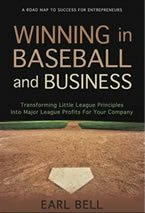Article first published as Book Review: Winning in Baseball and Business by Earl Bell on Blogcritics.
December 6, 2012
Winning in Baseball and Business:
Transforming Little League Principles into Major League Profits for Your Company
Earl Bell
Aviva Publishing (2012)
ISBN: 9781938686245
Hit a Home Run for Your Company with New Business Book
 Whether you are a baseball enthusiast, a Little League coach or parent, or a business owner looking to bring your company to the next level, you will find plenty to put new life into your game in Earl Bell’s new book Winning in Baseball and Business.
Whether you are a baseball enthusiast, a Little League coach or parent, or a business owner looking to bring your company to the next level, you will find plenty to put new life into your game in Earl Bell’s new book Winning in Baseball and Business.
Earl Bell, businessman and long-time coach to youth baseball teams, reveals the many similarities between baseball and business—including both being games and both needing great coaches—and how Little League principles can be applied to business. Whether or not you have an interest in baseball, you will be surprised to discover how “what it takes to create a winning baseball team” applies so perfectly to creating a successful business.
In each of ten “innings”—Bell’s preference for the book’s division over the word “chapters”—Bell takes Little League lessons and shows how they can be turned into Major League strategies for your business. Topics include how to define what success means for your team/business, how to create alignment among your team players, how to establish a culture with values, how to develop a strategy and execute a plan, and ways to know what risks to expect and how to manage or insure against them.
While a lot of business books are out there—some even using golf or other sports metaphors—Winning in Baseball and Business is the first time I’ve seen baseball principles applied to business, and using Little League as a starting point really illuminated for me the basic, complex, and even common sense ways to take a business to the next level. More than anything, Bell comes across as a coach—in baseball and business—who cares not only about winning, but about his team—he believes in encouraging his players, in making them all engaged in the game, in enhancing their strengths, and in making sure everyone plays. Not only is he a great coach, but he helped lead his team to a national tournament held in Cooperstown, New York, the birthplace of baseball. For Bell and his team, playing in this tournament was a definite sign of their success.
Just as it’s important to Bell that all his youth baseball players feel like they are part of a team with a culture of values, so he believes in developing employees into team players who take pride in and ownership of their work. And he applies the question of what motivates a youth to play baseball versus an adult to coach to understanding how an employee’s reasons for working in a business can be different than those of a business owner, and how those differences can be used to lead to alignment within the business’ team.
While Bell can’t coach every business (although he can be hired as a business coach or consultant), he helps the reader self-coach by providing excellent questions at the end of each inning in a workbook format. These questions allow for thoughtful review of what has been covered in each inning and they ask the reader to consider how what has been learned can be applied to his business. One of the most thought-provoking questions Bell asks is, “What would be the impact to your customers if your company no longer existed?” Finally, Bell offers a scorecard for each inning to help the reader determine how he is doing and what he can do better to lead his business to the Major Leagues.
As an extra bonus, Bell includes profiles of ten entrepreneurs who established their own successful business enterprises before they were eighteen, and he concludes each inning with the profile of a well-known billionaire from the past or present. With each profile, Bell reveals lessons we can learn from the entrepreneur or his or her own personal advice for others who want to achieve business success.
Bell is clearly a great coach for business or baseball; you couldn’t do better than to read Winning in Baseball and Business and apply its principles to your game. If I had a son in Little League, I’d want Earl Bell to be his coach, and if I were starting up a business, I would want him to be mine.
For more information about Earl Bell and Winning in Baseball and Business, visit www.WinninginBaseballandBusiness.com.
— Tyler R. Tichelaar, Ph.D. and author of the award-winning “Narrow Lives”

